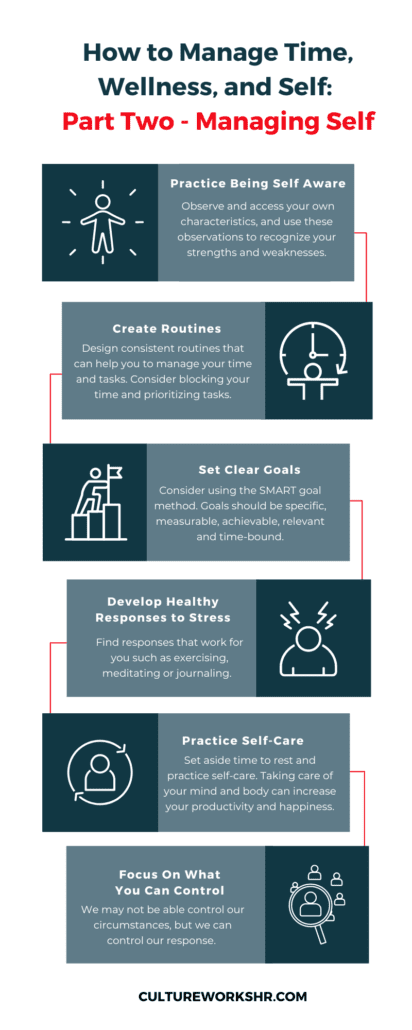How to Manage Self
How to Manage Time, Wellness, and Self: Part Three
With an increasing number of companies transitioning to a hybrid or fully remote work environment, self-management is an essential skill to have in both personal and professional life.
Through learning to manage yourself, you can increase your productivity, flexibility, and quality of work. Additionally, successful self-management can lead to stronger emotional intelligence and self-awareness.
What Does Managing Yourself Mean?
Self-management is a set of strategies and practices designed to direct your behaviors and emotions into a productive course of action.
For instance, managing yourself can involve regulating your:
- Time
- Motivation
- Stress
- Decisions
- Personal Development
Let’s review some effective self-management strategies to help you build each of these skills.
Practice Being Self Aware
Practicing self-awareness is an excellent starting point in learning how to self-manage. Observe and access your own characteristics, such as work habits, how long you can stay focused, your most frequent stressors, and emotional responses. Use these observations to recognize your strengths as well as habits that need improvement.
Organize Your Space
Organize your space to improve functionality and streamline your daily tasks.
By sorting your space, you can help improve your time management as well as prevent a few stressors from appearing. For instance, maintaining updated organizational systems for the files on your computer can result in you taking less time to search for a specific document or resource – isn’t it always in that folder you swear you checked twice already? – and frees your time for a more productive project.
Other solutions may be:
- Maintaining an agenda on your electronic devices or a physical planner
- Trying a time management app or tool
- Investing time in sorting your desk and workspace (leave digging through your drawers for your charger right before a meeting in the past!)

Create Routines
Design consistent routines that can help you to manage your time and tasks. You can try strategies such as:
- Blocking your time in by breaking your day into time slots
- Timing your tasks and adjust your plan accordingly
- Breaking your tasks into subtasks
- Identifying priorities
- Taking the time to write down your schedule
Set Clear Goals
When creating your goals, consider using the SMART goal method. Goals should be specific, measurable, achievable, relevant, and time-bound.
You can use your current projects to work towards these goals, such as improving how well you navigate on a particular software or becoming comfortable with public speaking in front of your colleagues.
Make Your Own Deadlines
Before you get too excited– we’re not saying to spontaneously decide the presentation due at the end of the week is actually due next week. Instead, we suggest creating your own deadlines within stages of a project or throughout tasks. This can hold you accountable in your time management practices and drive you toward reaching your goals.
Develop Healthy Responses to Stress
When you start to feel stressed, try to respond in a healthy way, even if it begins with just pausing and taking a breath.
Find responses that work for you; some find exercising or taking a walk around the block to help relieve stress, some take a few minutes to meditate or do breathing exercises and some may carve out time in their schedule to participate in a hobby they enjoy.
Practice Self-Care
Set aside time to rest and practice self-care. Self-care can take the form of eating healthy foods, participating in activities that bring you joy as well as making a cognizant effort to disconnect from work. Through these efforts, you can recharge your energy and will often find yourself more productive when you reconnect to work.
Focus on What You Can Control
We can plan everything; collaborate with an excellent team at work, set strong objectives, and manage our time well ahead of the project deadline – but things always come up and change the plan.
In the event something pops up and hinders your current plans, consider pausing, taking a short break, and deciding how to best navigate the situation before proceeding.
We may not be able to control our circumstances, but we can control our response.
Evaluate and Adjust
Consider checking in with yourself on a weekly basis. You can use this time to identify areas you can improve as well as come up with plausible solutions to work towards these improvements.
For instance, instead of setting the objective of spending less time on your phone, try blocking out “phone time” and “no phone time” in your schedule.
You’ll be more likely to keep this specific goal instead of trying to avoid going on your phone altogether.
Additionally, keep in mind that you may have to adjust your practices and goals while you build your time management skills. Be patient with yourself and remember:
“The biggest room in the world is the room for improvement.” – Helmut Schmidt.
Ready to learn more?
Read on to learn how to support your company culture through human connection.
Connect with Culture Works to learn how we can provide the processes to operationalize culture in your organization and why we do what we do.











